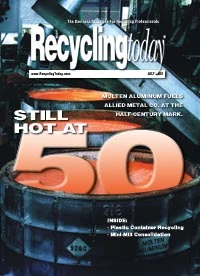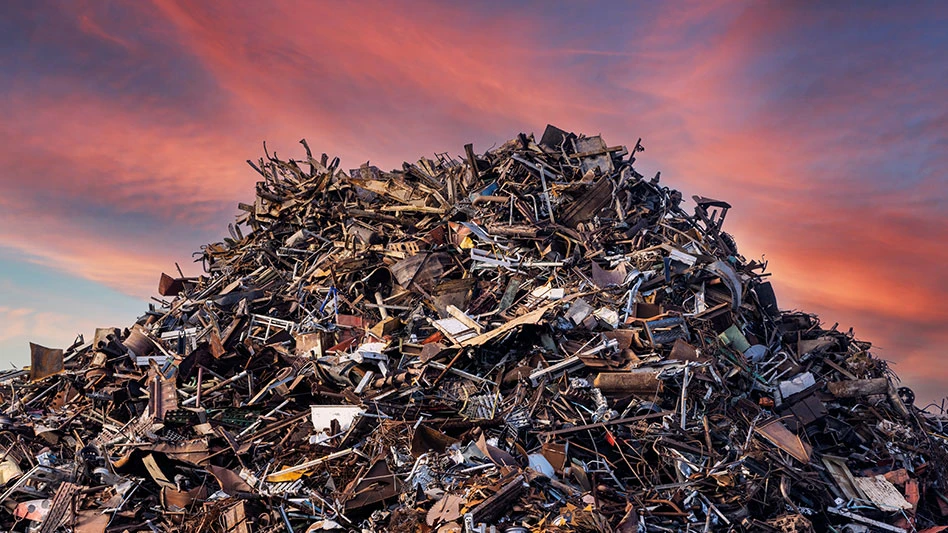There are plenty of challenges to meet for Allied Metal Co., Chicago, a third-generation nonferrous smelting business.
In a recycling sector that has witnessed dozens of business closures during the
last decade alone, Allied Metal Co., Chicago, is celebrating its 50th anniversary in 2002. While the secondary aluminum smelter and zinc alloyer prospers entering its second half-century, the current executive team is also addressing the daunting odds any family business confronts: succeeding into, and through, the third generation of leadership.
According to a Web page posted by the Family Business Forum of Rutgers University, "more than 80 percent of first generation family firms do not survive to the second generation and only 13 percent evolve to the third generation." Underscoring the importance of family businesses to the American economy, the Rutgers site further points out that "family businesses generate about half the gross national product and half of the total wages paid" and "represent about 90 percent of all U.S. businesses and over one third of Fortune 500 companies."
Well-Timed Transitions
The roots of Allied Metal Co. trace back to Irving Dubofsky, who arrived in the U.S. from Russia in 1921. Dubofsky applied the scrap collecting savvy he learned from his father’s business while a youth overseas, and for years gathered old iron and rags from Chicago’s neighborhoods.
In 1952 Dubofsky was instrumental in forming the organization, which would ultimately become one of America’s oldest and largest independently-owned secondary aluminum and zinc smelters.
Marvin Fink, the late Dubofsky’s son-in-law, began with the firm in 1957 and presided over it through the end of the 1990s. He is presently retired and serves as chairman of the board.
Day-to-day stewardship now rests in the hands of Fink’s older son David, president; younger son Joel, vice president of trading; and son-in-law Mike Gilford, vice president of sales.
To ensure a smooth transition, the firm has also engaged the services of Kenneth Kaye of Evanston, Ill., a consulting specialist who helps companies identify and resolve succession issues. Joel Fink recounts, "Even before we started conferring with Kaye, we contacted a number of similar businesses we admired. Eventually, we understood what we had to do, took on the challenge, and the tough part is behind us now."
Third-Generation Strategies
Joel Fink emphasizes the obligation for the third generation to uphold what he calls the time-honored Allied character and way of doing business. "We put our family reputation on the line with every transaction at Allied," says Joel. "That’s something you won’t find in a big new conglomerate. Many people still remember my grandfather, and at Allied we still operate according to his principles of doing what we say we will."
Mike Gilford sees as another third-generation tactic the need to navigate around the steady demise of personalized business relationships at all industry levels. He recalls the not-too-distant past when Allied representatives, all well-versed in die casting operations, could drop in on business owners and recommend ways to boost plant productivity on the spot. Now, multiple middle managers and purchasing agents typify the other side of the relationship - people who wear many hats and do not have the time to benefit from Allied experience.
"We hear a lot of ‘just fax us your price,’" Gilford contends. "On top of that, while everyone gets greater knowledge from the Internet, e-commerce doesn’t create loyal, lasting relationships." He also attributes the industry’s person-to-person disconnect to declining involvement in trade organizations, due both to the recent economic downturn and the modern need to balance work and home responsibilities.
The View from Outside the Family
When asked if the thought of keeping up with a younger generation felt threatening, key non-family managers firmly rejected the common notion of automatic resistance to change. Instead, they expressed excitement and high hopes about seeing the company evolve.
Barry Cohen, vice president of purchasing and a 20-year Allied veteran, feels reassured by the firm’s steady stream of technical and marketing advancements. "This new generation understands that surviving means going beyond traditional quality-based competition. Quality simply gets you in the game," he says. Instead, Cohen believes that unique innovations and strategies will determine tomorrow’s market winners, and that the company’s third generation is well qualified to meet those challenges.
He recalls his own initial feelings about entering a family business, saying, "I purposely wanted to join one because I was at a large conglomerate and knew I could make a bigger impact in a smaller situation." Like many long-time employees, Cohen has worked with every Allied generation. "We emerge with new family executives yet always keep our original ethics," he affirms.
Vice president of operations Hal Jernigan attributes the company’s low turnover to the trust the executive family creates. He joined Allied 22 years ago. "The family creates a comfort level that makes it great to work here, whether you’re in Chicago or at our Chattanooga, Tenn., plant that Jerry Hass heads up. People don’t leave us for lateral jobs, only for moving up, school or retirement."
Carol Bednar, accounting manager, came to Allied 17 years ago. "David, Joel and Mike are continuing the company’s tradition of embracing us into their family lives. They invite us to all their major celebrations, and they always come to ours."
Overall, Bednar describes the progression into the new generation as being smooth. "We were kept up to date with the facts, they laid out their roles, and it’s working very well," she says. She also believes that an aggressive younger team brought up in a business can facilitate recruiting. "It makes it easier for young people to identify with manufacturing, which nowadays usually isn’t their first career choice."
Posting 33 years with Allied, Tony Sole, manager of Chicago’s Canal Street plant, is among the company’s most senior staffers. "People come here and stay. Everyone knows that each new generation will take care of us because our work will take care of them." Sole says this spirit extends to watching costs. "Being a tight-knit company, we’re close to what’s going on. We see our effect on our profit-sharing plan."
The Company's Status Today
Sponsored Content
Labor that Works
With 25 years of experience, Leadpoint delivers cost-effective workforce solutions tailored to your needs. We handle the recruiting, hiring, training, and onboarding to deliver stable, productive, and safety-focused teams. Our commitment to safety and quality ensures peace of mind with a reliable workforce that helps you achieve your goals.
Allied presently owns four production centers. Three plants are located in Chicago and the fourth is in Chattanooga. To stay at the forefront of the industry, Allied recently acquired additional land parcels adjacent to two sites - one in Chicago and one in Chattanooga.
The firm supplies metals to die casters and foundries that serve the appliance, automotive, electronics, furniture, hardware, housewares, sporting goods and toy industries, among others.
Allied has the capacity to produce up to 120 million pounds of aluminum alloys each year. These products, available in ingot, molten and sow form, cover a broad spectrum of alloy specifications. Many are deliverable for London Metal Exchange contracts.
Favorable Expectations
Members of the third generation, all in their late 30 to early 40s, speak with a unanimous voice. They have no doubt that they are well on their way toward triumphing over the succession challenges that face a family business.
"Today’s business partners want confidence that the people they deal with have long-term staying power," Mike Gilford observes. "We’re getting the word out - they can be reassured Allied will be here for them, just like we were for the last 50 years."
Joel Fink reasons, "We pretty much have the size of the pie we want, and bigger isn’t necessarily better. We intend to stay profitable at our current size by continuing to innovate."
On a final fast-forward note, Carol Bednar muses, "I think I should stay ready to do this again. I enjoy the times when the fourth generation [Joel Fink’s or Mike Gilford’s children, ages up to 13] come in and ask me how things work around here."
The author is a public relations specialist who prepared the article on behalf of Allied Metal Co. This article is a modified version of a story that appeared in Die Casting Magazine.
Get curated news on YOUR industry.
Enter your email to receive our newsletters.

Explore the July 2002 Issue
Check out more from this issue and find your next story to read.
Latest from Recycling Today
- Steel Dynamics cites favorable conditions in Q1
- Hydro starts up construction in Spain
- Green Cubes unveils forklift battery line
- Rebar association points to trade turmoil
- LumiCup offers single-use plastic alternative
- European project yields recycled-content ABS
- ICM to host colocated events in Shanghai
- Astera runs into NIMBY concerns in Colorado







